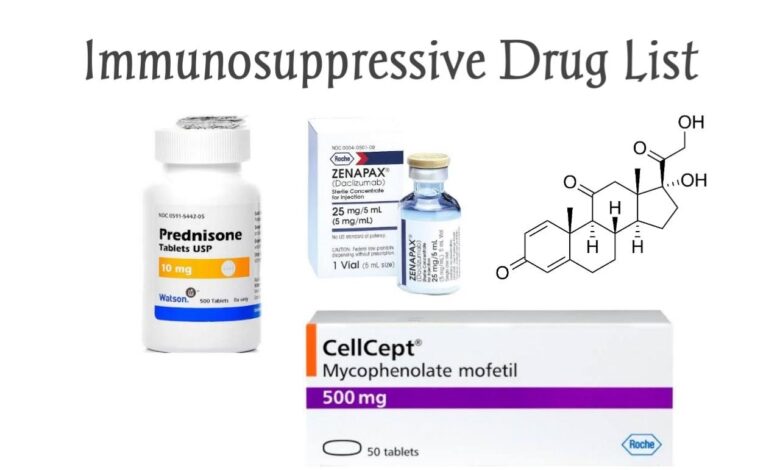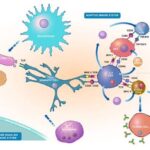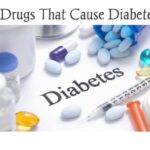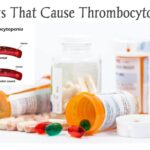Immunosuppressant Drugs List

Immunosuppressant drugs are medications that keep your immune system in check. The body’s immune system helps fight off infections that cause illness. But sometimes, the immune system mistakenly attacks healthy cells and tissues.
When you have an autoimmune disease, the immune system mistakes healthy tissue and cells for foreign invaders (like germs). The immune system essentially turns against the body and attacks it. Depending on which part of the body is under attack, this response can lead to different types of autoimmune diseases.
Immunosuppressants hold back the immune system, helping to prevent cell damage and inflammation. These drugs minimize symptoms. They can even put an autoimmune disease into remission (you have no signs of the disease). Immunosuppressants can slow or stop this response.
Classification of Immunosuppressive drugs
Immunosuppressive drugs can be classified into five groups which include:
Glucocorticoids: Glucocorticoids are powerful medicines that fight inflammation and work with your immune system to treat a wide range of health problems. Glucocorticoids are among the most potent anti-inflammatory and immunosuppressive agents. They inhibit the synthesis of almost all known cytokines and several cell surface molecules required for immune function, but the mechanism underlying this activity has been unclear. Examples of glucocorticoids Immunosuppressant drugs include:
- beclomethasone
- betamethasone
- budesonide
- cortisone
- dexamethasone
- hydrocortisone
- methylprednisolone
- prednisolone
- prednisone
- triamcinolone
Cytostatics: Cytostatic drugs inhibit cell division. Cytostasis is an important prerequisite for structured multicellular organisms. Without regulation of cell growth and division, only unorganized heaps of cells would be possible. In immunotherapy, they are used in smaller doses than in the treatment of malignant diseases. They affect the proliferation of both T cells and B cells. Due to their highest effectiveness, purine analogs are most frequently administered.
Examples of cytostatic immunosuppressing drugs include:
- Lomustine
- Nimustine
- Streptozocin
- Bendamustine
- Chlormethine
- Cyclophosphamide
- Estramustine.
- Carmustine
Antibodies: Antibodies are sometimes used as a quick and potent immunosuppressive therapy to prevent acute rejection reactions as well as a targeted treatment of lymphoproliferative or autoimmune disorders. Examples of immunosuppressive antibodies include:
- Polyclonal antibodies
- Monoclonal antibodies (IL-2 receptor- (CD25-) and CD3-directed antibodies
- T-cell receptor directed antibodies
- IL-2 receptor directed antibodies
Drugs acting on immunophilins: Immunophilins are a large family of broadly expressed proteins that bind to certain immunosuppressive agents, such as ciclosporin A (CsA), tacrolimus, and rapamycin. Due to their potent immunosuppressive effects that predominantly target T lymphocytes, these agents are fundamental components of immunosuppressive regimens in both solid organ and bone marrow transplantation. Examples include:
- Ciclosporin Ciclosporin (Novartis’ Sandimmune) is a calcineurin inhibitor (CNI). It has been in use since 1983 and is one of the most widely used immunosuppressive drugs. It is a cyclic fungal peptide, composed of 11 amino acids.
- Tacrolimus (Prograf, Astagraf XL, Envarsus XR) is a product of the bacterium Streptomyces tsukubaensis. It is a macrolide lactone and acts by inhibiting calcineurin. The drug is used primarily in liver and kidney transplantations, although in some clinics it is used in heart, lung, and heart/lung transplantations.
Other drugs that suppress immunity: Several other drugs can also suppress the human immune system they include:
- Interferons. used to slow down the progression of multiple sclerosis. IFN-γ is able to trigger lymphocytic apoptosis.
- Opioids. Prolonged use of opioids may cause immunosuppression of both innate and adaptive immunity.
- TNF binding proteins. They are used in the treatment of rheumatoid arthritis, ankylosing spondylitis, Crohn’s disease, and psoriasis.
- Mycophenolate. Mycophenolic acid acts as a non-competitive, selective, and reversible inhibitor of Inosine-5′-monophosphate dehydrogenase (IMPDH), which is a key enzyme in the de novo guanosine nucleotide synthesis. Mycophenolate mofetil is used in combination with ciclosporin or tacrolimus in transplant patients.
Are there any side effects from taking immunosuppressant drugs?
Yes, immunosuppressant drugs increase the risk of infections. This is a major problem in the early period after a transplant or following treatment of rejection because the dosage of these drugs is higher at these times. You should call your doctor if you have:
- a fever above 100 degrees
- drainage from your surgical scar
- burning when you pass your urine
- a cold or cough that will not go away
The most common side effects of immunosuppressant drugs are “stomach upset”. If this happens, ask your doctor if you can space your medicine at different times to help with this problem.
About 6 months to a year after transplant, the immunosuppression is usually lowered and the chance of side effects should be low. If you still have side effects, speak to your transplant team to either change the dose or switch to a different medicine. Changes to immunosuppressant medicine should only be made after checking with your transplant center.
Are there other medicines and food that can act against immunosuppressants?
Yes. There are several drugs, food, and supplements that can change the levels (up or down) of immunosuppressants in the blood. Some of the common ones are grapefruit juice, St. John’s Wort, erythromycin, anti-TB (tuberculosis) medicines, anti-seizure medicines, and common blood pressure medicines (Cardizem or diltiazem, and Verapamil).





